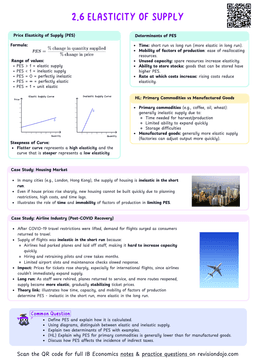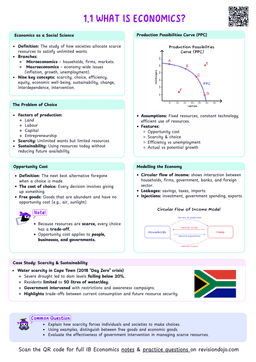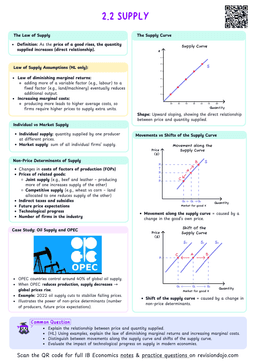Monetary Union
A common market between countries who also share a common currency and a common central bank.
Compared to common markets, monetary unions have a greater level of integration since they share a:
- Common currency: All member countries use the same currency.
- Common central bank: A single central bank manages the monetary policy for all member countries.
The Eurozone is a monetary union where 19 of the 27 European Union (EU) countries use the euro (€) as their common currency, managed by the European Central Bank (ECB).
Regardless of the level of economic integration that monetary unions possess, it has its advantages and disadvantages (4.4.5 Advantages & Disadvantages of Monetary Union HL).
Tip
It is advised to learn and understand 4.5 Exchange Rates and 4.6 Balance of Payments before reading the content below.
This is because relevant concepts from the two topics are discussed below.
Advantages of monetary unions
Exchange rate certainty
- A common currency eliminates the risk of exchange rate changes between member countries.
- Therefore, it reduces uncertainties for traders and investors, who might have needed to predict future exchange rates.
- Further, this stability encourages trade and investment within the union as:
- It removes the hassle of exchanging currencies, benefitting importers and exporters.
- This leads to easy trade and investments, which helps achieve a more efficient allocation of resources.
Price Transparency
- This is the ability for producers and consumers to be able to perform price comparisons in any member country without having to do calculations or conversions.
- Therefore, it allows economic decision-makers to observe price differences and price comparisons which is more accurate and faster to retrieve.
- This could lead to promoting competition and efficiency, which could cause lower prices for consumers.
No Transaction Costs
- Both consumers and producers save money by not needing to exchange currencies and pay a fee to the bank or institution for the conversions.
- These savings can be significant and could lead to further trade and investments.
Increased Inward Investments
- The absence of exchange rate risks makes monetary unions more appealing for foreign direct investment (FDI).
- Therefore, with higher FDI, there will be higher economic growth and job creation.
Low Rates of Inflation
- Unlike normal cases, member countries cannot depreciate the currency (since there isn't a domestic currency) if they have a high rate of inflation, hence a current account deficit.
- Thus, all member countries are committed to keeping a low rate of inflation.
- This provides a multitude of important benefits:
- Low rates of interest
- Higher levels of investments
- Higher production output
Disadvantages of monetary unions
Loss of domestic monetary policy
- Each member country cannot change the level of economic activity, in specifics the interest rate by implementing its own monetary policies.
- This is because monetary policies are set by the central common bank.
- Therefore, each member country will have difficulties to correct its economic challenges such as low/high inflation, unemployment, etc.
Loss of exchange rate
- The member country can no longer depreciate the currency to correct a trade deficit as it does not have a national currency anymore.
- Further, it cannot solve high risks of inflation using currencies.
- This lack of flexibility or options can make it harder to respond to economic shocks as it has to rely on fiscal policies to correct any imbalances.
Convergence Requirements
- Even though each member country still has abilities to implement its own fiscal policies, there are convergence requirements that the countries need to adhere to.
- Factors such as setting limits on total public debt budget deficits, etc limit the extent or level of fiscal policies member countries can implement.
- Convergence requirements is often debated as:
- Many member countries view it as an advantage since it enforces fiscal discipline.
- Whilst, many believe it acts as a restriction of the authority or sovereignty of a country's government.
Loss of Sovereignty
- Mentioned previously, there are no national central banks for each member country and national governments are unable to implement policies freely due to convergence requirements.
- Rather, the central bank and an independent body implements and oversees policies. This is a severe loss of sovereignty.
1. What is a monetary union, and how does it differ from other forms of economic integration?
2. Can you explain the advantages and disadvantages of being part of a monetary union?
3. How does a common currency impact trade and investment between member countries?
Case studyThe Eurozone – A Monetary Union with Challenges and Successes
Background
The Eurozone is a monetary union comprising 20 of the 27 European Union (EU) member states, all of which have adopted the euro (€) as their official currency. It was formally established in 1999, with physical euro banknotes and coins introduced in 2002. The Eurozone’s primary goals are to enhance economic integration, reduce trade barriers, and maintain price stability.
The European Central Bank (ECB) is responsible for setting monetary policy, managing inflation, and ensuring financial stability across all member states. While the Eurozone has successfully facilitated trade and economic cooperation, it has also presented challenges, particularly during economic crises.
The Benefits of the Eurozone and Germany’s Success Story
Germany, Europe’s largest economy, has greatly benefited from its membership in the Eurozone. As a country heavily reliant on exports, Germany has capitalized on the advantages provided by a common currency and a stable economic environment.
Exchange Rate Certainty & Increased Trade
- Before the adoption of the euro, frequent currency fluctuations created uncertainty for businesses engaged in cross-border trade.
- With the euro, German companies such as Volkswagen, Siemens, and BMW no longer had to hedge against exchange rate risks, reducing costs and improving efficiency.
- The stability of the euro contributed to a 43% increase in intra-Eurozone trade between 1999 and 2019, according to the European Commission.
- In 2023, Germany’s exports totaled $1.7 trillion, with nearly 40% of its trade occurring within the Eurozone.
Price Transparency & Increased Competition
- The euro allows consumers and businesses to compare prices across different countries without exchange rate distortions.
- This has intensified competition, particularly in sectors such as retail, tourism, and consumer goods, where businesses must offer competitive prices.
- For example, German automotive brands have gained a stronghold in markets like France and Italy, as price uniformity within the Eurozone makes German products attractive across borders.
Foreign Direct Investment (FDI) & Economic Growth
- The Eurozone’s stability has made it an attractive destination for foreign direct investment (FDI).
- Germany has benefited from FDI inflows exceeding €36 billion in 2022, particularly in high-tech manufacturing and automotive industries.
- Countries like Ireland have also gained, with multinational firms such as Google, Apple, and Meta choosing Ireland as their European headquarters due to its Eurozone membership.
Low Inflation & Stable Interest Rates
- The European Central Bank (ECB) has kept inflation rates relatively low, ensuring a stable economic environment for long-term investment.
- Between 2002 and 2021, the Eurozone maintained an average inflation rate of 1.7%, significantly lower than non-Euro EU countries like Hungary and Poland.
- Countries such as Austria and Finland have benefited from low borrowing costs and stable business conditions, enabling companies to expand operations efficiently.
The Challenges of the Eurozone and Greece’s Debt Crisis
While the Eurozone has provided economic benefits, it has also exposed vulnerabilities. Greece’s financial crisis between 2009 and 2015 highlights the risks associated with being part of a monetary union.
Loss of Monetary Policy Control & Fiscal Constraints
- In the 2008 global financial crisis, Greece experienced a 25% contraction in GDP, while unemployment soared to 27.5% in 2013.
- Normally, countries facing economic downturns can devalue their currency to boost exports and regain competitiveness. However, Greece, being in the Eurozone, could not adjust its exchange rate.
- The European Central Bank (ECB) controlled monetary policy, meaning Greece could not lower interest rates or inject liquidity into the economy to stimulate growth.
Strict Convergence Requirements & Austerity Measures
- As part of the Eurozone, Greece was subject to strict fiscal rules that limited government intervention in economic recovery.
- In 2010, Greece received a €110 billion bailout from the EU and the International Monetary Fund (IMF), with strict conditions, including:
- Massive public spending cuts
- Pension and wage reductions
- Increased taxes
- These austerity measures, meant to reduce Greece’s budget deficit, led to widespread protests and a decline in living standards.
Trade Deficit & Economic Imbalance
- Unlike Germany, Greece lacked strong export industries.
- By 2015, Greece’s trade deficit stood at €17.5 billion, as it imported more than it exported.
- Without a national currency, Greece could not devalue the euro to make its products more competitive, worsening its economic troubles.
Loss of Sovereignty & Dependence on External Institutions
- The crisis led to Greece relying on the ECB, EU, and IMF for economic decisions, effectively surrendering control over fiscal policies.
- In 2015, the ECB limited cash withdrawals in Greek banks to €60 per day, worsening the economic panic.
- Greek citizens voted against austerity in a referendum, but the government was forced to comply with EU requirements to secure further bailout funds.
Questions
- Define the term monetary union and explain how it differs from a common market.
- Identify and explain two advantages of a monetary union using examples from the Eurozone case study.
- Outline the role of the European Central Bank (ECB) in managing the Eurozone’s monetary policy.
- Using the example of Germany, analyze how exchange rate certainty and price transparency have contributed to economic growth within the Eurozone.
- Explain how the loss of exchange rate control negatively affected Greece’s ability to recover from the 2008 financial crisis.
- Evaluate the impact of monetary union membership on a country’s ability to implement independent fiscal and monetary policies.
- "Monetary unions provide economic stability but limit national policy-making flexibility." Discuss this statement using examples from both Germany and Greece.
To what extent should countries sacrifice economic sovereignty for the benefits of deeper economic integration?


